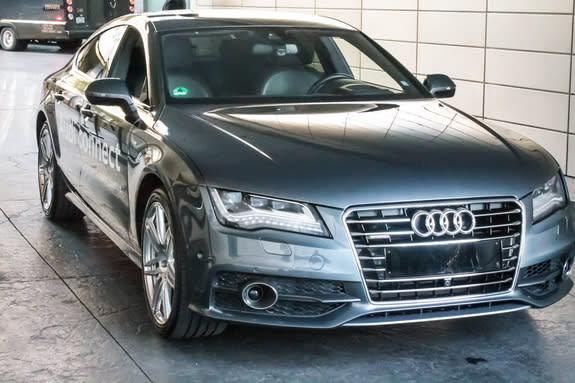There's No Law Against Self-Driving Cars

Flying cars are still a Jetsonian dream, but self-driving cars are just over the horizon. Recently, Google and Audi have showed off autonomous automobiles that do some, but not all, of the driving for you.
Demonstrations of self-driving cars — as well as government-sponsored competitions — generally take place in empty parking lots or other controlled spaces. Because, of course, they aren't legal on the open road. Or are they?
In fact, the answer is most likely yes — depending on how you define a self-driving car.
Just because something is new doesn't make it illegal. Bryant Walker Smith, who lectures at Stanford University on legal issues concerning vehicle automation, has found no laws that directly prohibit automated vehicles.
We're used to the notion of wild mustangs roaming the plains. But what about wild Ford Mustangs?
That won't quite happen. In a 100-page report on the topic, Smith wrote that the most relevant regulation seems to be the 1949 Geneva Convention on Road Traffic, which was backed by the United States and other countries to help make some driving practices international. It says only that a car must have a driver who can take control of it.
That may be one of the reasons that car companies don't call their efforts self-driving vehicles. Instead, they promote assisted driving.
Annie Lien, who works in strategic product development for Volkswagen on "piloted" driving projects, says most of the practical self-driving technologies we'll see on the roads five years from now won't constitute fully automated vehicles. Drivers will still need to start and stop a car, for example. At this year's Consumer Electronics Show, Audi (a division of Volkswagen) showed off a self-parking car that acted on driver's requests as sent through an iPhone app. [See also: Audi Debuts Self-driving Car]
"The person still has final say over the machine," Lien says.
Self-driving cars that Audi, Google and others have shown all require people to direct them in some way, which means they would likely be covered by existing law.
The bigger legal issues are in the realm of liability. Who is responsible if a self-driving car gets in an accident — the car's owner, the manufacturer or the software developer? Smith raises the questions in his paper, but says that there simply aren't answers yet.
California, Nevada and Florida recently passed laws that require regulation on how to test self-driving cars, and many other states are considering the issue. But those laws don't address everyday drivers. Lien says the automobile industry thinks that self-driving car regulations should come at the federal level, because differences in state laws could cause confusion and hamper innovation.
As for a truly self-driving car that can get you from one point to another by itself, car enthusiasts will have to remain patient. Lien says we're still many years away — even decades — from that goal as technology behind it is further developed.
This story was provided by TechNewsDaily, a sister site to LiveScience. Follow TechNewsDaily on Twitter @TechNewsDaily, or on Facebook.
Copyright 2013 LiveScience, a TechMediaNetwork company. All rights reserved. This material may not be published, broadcast, rewritten or redistributed.

